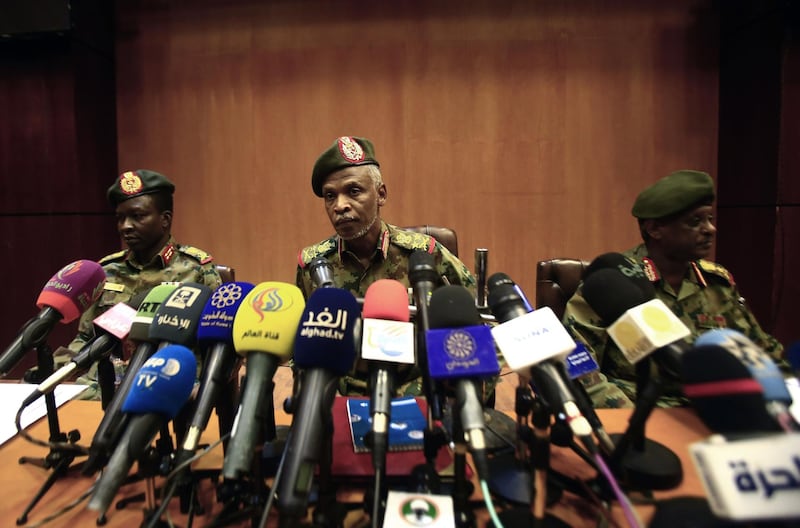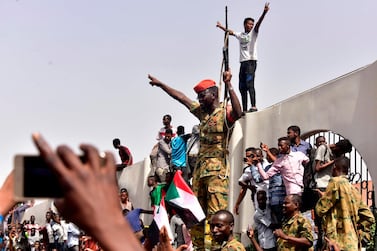Officers who ousted President Omar Al Bashir from three decades in power have announced that a military council will run Sudan for a transitional period lasting up to two years, followed by elections.
But one day after Mr Al Bashir's overthrow, Awad Ibn Auf, the ousted leader's minister and vice president, stepped down as the council's head, and he said the council's deputy head, Kamal Abdelmarouf Al Mahi, was also relieved of his position.
Ibn Auf said that, after consultations, he chose Lieutenant General Abdel Fattah Al Burhan Abdelrahman as the new head of the council.
No other members on the council were known other than its head and deputy head. The head of the transitional military council's political committee, Omar Zain Al Abideen, told a news conference earlier on Friday the announcement of the remaining members had been delayed for further consultations.
It remains unknown when the transitional military council's members will be announced.
No details have emerged about how many members will be on it or its make-up.
Here are the men who stepped in after Mr Al Bashir was forced from office:
Abdel Fattah Al Burhan Abdelrahman
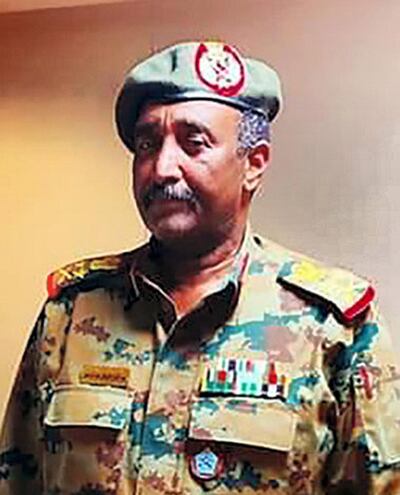
General Abdel Fattah al-Burhan, the second officer to be sworn in as Sudan's new military ruler in consecutive days, is a "veteran soldier" largely unknown outside the army.
Protesters, determined to see a civilian government after the end of Mr Al Bashir's iron-fisted three decades in power, saw Mr Ibn Ouf as a regime insider and a close aide of the toppled leader.
Mr Ibn Ouf's exit has catapulted Lt Gen Al Burhan from the shadows to the de facto head of the country.
"Burhan is a high ranking officer within the armed forces, but basically he's a veteran soldier," said an army officer, who did not want to be named.
"He's never been in the limelight like Ibn Ouf or General Kamal Abdelmarouf," the officer said, referring to the army's former chief of staff.
Lt Gen Al Burhan had a stint as Sudan's defence attache to Beijing.
On Friday, hours before he was named as Sudan's new military ruler, he was seen talking to protesters who have camped outside the army headquarters since April 6.
Born in 1960 in the village of Gandatu, north of Khartoum, Lt Gen Al Burhan studied in a Sudanese army college and later in Egypt and Jordan.
He is married and has three children.
He was commander of ground forces before Mr Al Bashir made him inspector general of the army in February.
Sudanese media and analysts say Lt Gen Al Burhan coordinated sending Sudanese troops to Yemen as part of a Saudi-led coalition against the Iran backed Huthi rebels.
Willow Berridge, author of Civil Uprisings in Modern Sudan and lecturer in history at Newcastle University says the Yemen portfolio saw Lt Gen Al Burhan work closely with Sudan's paramilitary Rapid Support Forces (RSF).
It is with the support of this group that "he now appears to have come to power," said Ms Berridge.
"The role in this latest move of the Rapid Support Forces – branded by many as a revamped version of the Janjaweed militias who committed mass atrocities in Darfur – will make many cautious," Ms Berridge added.
"Burhan doesn't have any political leanings, he is a professional soldier," the anonymous officer said.
But as de facto head of the country, he will not be able to escape making difficult political decisions.
Awad Ibn Auf Awad
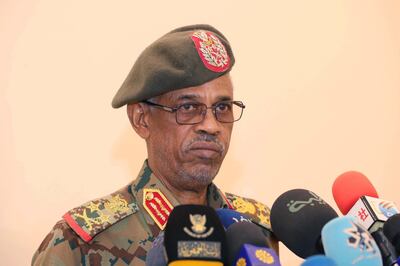
Ibn Auf was defence minister since 2015, before Mr Al Bashir promoted him to first vice president in February as protests against him intensified.
He abruptly resigned as head of the transitional military council on Friday, about 24 hours after he was announced as its head.
He is widely believed to have strong ties to Islamists and is accused by the United States of being a liaison between the government and the Janjaweed militia, blamed for much of the atrocities in Darfur.
Washington placed sanctions on Mr Ibn Auf and others in 2007 "for their roles in fomenting violence and human rights abuses in Darfur," freezing his assets in the United States and banning Americans from doing business with him.
Full profile: The veteran of Bashir era who held power for a day
Kamal Abdelmarouf Al Mahi
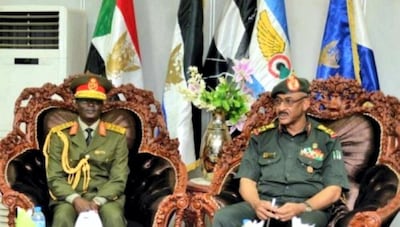
General Kamal Abdelmarouf Al Mahi was the Sudanese military's chief of staff since February 2018 and is little-known in public life.
Mr Al Mahi, who is also thought to have close ties to Islamists, replaced Emad Al Din Adawi, who had been rumoured as a possible successor to Bashir. Mr Ibn Auf said he was relieved of his role as deputy head of the transitional military council on Friday.
Salah Abdallah Mohamed Saleh
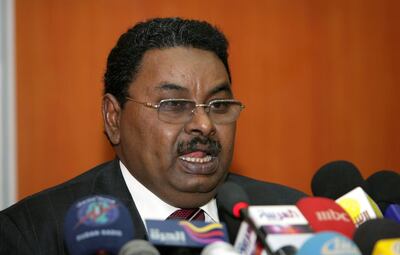
Salah Abdallah Mohamed Saleh, commonly known as Salah Gosh, headed the powerful National Intelligence and Security Service (NISS) until he too stepped down on Saturday. He had also led the service between 2004 and 2009, and was reinstated in February 2018.
Mr Gosh served as a security adviser to Mr Al Bashir for two years before he was detained in 2012 and held for several months, accused of "inciting chaos", "targeting" some leaders and spreading rumours about Mr Al Bashir's health. The New York Times reported in 2005 that US intelligence officials had allowed Mr Gosh to visit the country for consultation with the CIA as a reward for Sudan's cooperation in detaining suspected militants and providing information on Al-Qaeda following the September 11, 2001, attacks. The NISS were active in the attempted crackdown on protests that broke out in December and led – after four months – to Mr Al Bashir's departure.
Mohamed Hamdan Dagalo
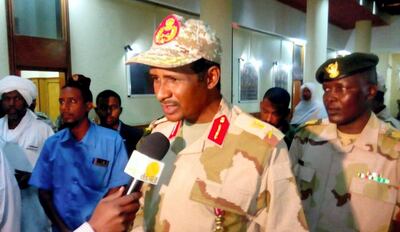
Mohamed Hamdan Dagalo, commonly known by his nickname Hemeti, is the head of the Rapid Support Forces, a paramilitary group that grew out of the Janjaweed militia, which operated in Darfur. The government had denied any wrongdoing by the RSF despite international claims and the International Criminal Court indictments for senior figures.
